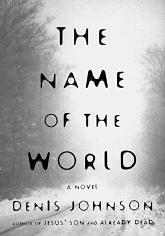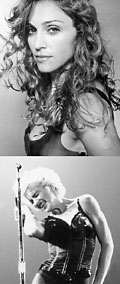Mike Reed, an adjunct associate professor of history at a small Midwestern college and the protagonist of Denis Johnson’s The Name of the World, describes a drawing he visits time and again at the school’s art museum. A series of squares surrounding a central square sketched by a slave, “the drawing, except for the central square, had been accomplished freehand: Each unintended imperfection in an outline had been scrupulously reproduced in the next, and since each square was larger, each imperfection grew larger too, until at the outermost edges the shapes were no longer squares, but vast chaotic wanderings.”
THE NAME OF THE WORLD
by Denis Johnson (HarperCollins, $22)
This drawing maps Reed’s life. A self-described J. Alfred Prufrock in his 50s, Reed began his career as a high school social studies teacher, then was a speechwriter for an infamous senator, until, disillusioned with politics, he ended up in academia, in which he “ran small seminars, asking bright, undirected students to read books I’d already read and then listening while they presented papers to the rest of the group for criticism. In other words, I didn’t do anything.”
A sense of futility marks all aspects of Reed’s life: the memories of his wife and daughter’s fatal car accident; his fading colleagues, who Reed calls “practitioners of a sacred mediocrity, an elegant mediocrity cloistering inaccessible tortures”; his interpretation of the surrounding world, which, like the student skaters Reed watches travel in circles on a makeshift ice rink, “seemed to illustrate not life and youth and games, but training.” As Reed undergoes a lackluster odyssey from a cog in America’s intellectual machine to a man without a job, his only chance of discovering a new path in life seems to lie in Flower Cannon, a 26-year-old redhead—and, at various times, cellist, performance artist, caterer’s assistant, stripper, and possible ghost—who, by example, just might be able to knock Reed out of his unremarkable existence.
While Johnson developed a cult readership through his edgy writing style and drugged-out characters in Jesus’ Son and Already Dead, he both ditches the heroin and keeps the cool in this latest novel. Applying his signature style to a middle-class husband and father suffering from a midlife crisis, Johnson turns what could be a hackneyed situation into a strange and transcendent story. Even though the depressed Reed is trapped inside his aging body, Johnson provides him with fresh and inspiring insights. He comments on the museum guard with whom he’s never shared a conversation: “I felt a kinship with Bill—an illusory kinship, like the strange shocking wedding you experience with a figure who turns his face toward you as you flicker past in a train—to inhabit a frame for them, as they inhabit for you. . . .”
In much of his fiction, Johnson’s characters seem to possess odd qualities in order to brand his work as eccentric; in this novel, however, characters’ lives serve as parables for the protagonist, like the history professor whose “battle [with cancer] had shot her full of fire. . . . The fight had apparently been successful, the cancer was driven back, and now Clara seemed her sad self again.” Or, like Reed’s fellow bus passenger, the “tiny old gentleman wearing sunglasses like the black bulging eyes of an insect,” characters represent secrets waiting to be revealed: “I sensed he was being stoic about something enormous.”
During a dinner party, Reed overhears a younger novelist criticizing an older, more established author: “‘Now it’s just people covered in jewels, people on yachts, people at state dinners. . . . I’m sorry, I mean I say this as an admirer, a follower, an emulator even—but don’t you think you’re turning into sort of a lap-dog for the privileged?'” In The Name of the World, Johnson, who’s nurtured his literary identity around hip and unconventional scenarios, plunges deep into Reed’s melancholic, graying psyche to emerge an even more accomplished author, acquiring a newfound maturity while staying true to his roots.








